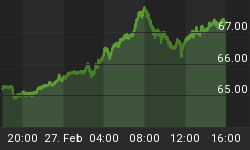Bill Gross of PIMCO spoke to Erik Schatzker and Stephanie Ruhle on Bloomberg TV's "Market Makers" today and said, "I would be leery of German bunds simply because there are only a few scenarios in which they can do well...Germany for me is a credit risk. It's not an attractive market."
Gross went on to say that Spanish bonds are "not a safe environment," and right now, the U.S. and U.K. are the "cleanest dirty shirts."
Gross on what he sees happening in Europe:
"I would be leery of German bunds simply because there are a few scenarios in which they can do well. If they will do well, if Germany leaves the zone and some way or another move back to the deutsche mark opposed to the euro and pay off obligations in euros and benefit because of it. Otherwise, increasingly, as we have seen over the weekend in terms of Greece, this kick the can environment adds liabilities to the German balance sheet day after day. They have what they call it a target 2 type of liability where they assume constant liabilities from Spain, Italy, and others as they move to the German Bundesbank. Increasingly, as the months move on, Germany becomes more and more liable for the euro balance sheet despite the possibility that Greece departs. Germany to me is a credit risk and certainly in terms of its tight shirt and shrinking shirt at the sleeves, is not an attractive market."
On countries like Germany and Japan:
"We were making a point in internal discussions that these clean dirty shirts have to fit. To the extent that these have been shrunk at the dry cleaners and the sleeves are up to the elbows in terms of low yields then perhaps you do not want to wear that shirt either. That is the case in Germany, not necessarily the case in Japan. In Germany, we have seen a bubble of some proportions as money is moving from Greece and other peripherals into the heart and the core of euro land. Would I buy a two-year German Schatz at close to 0% yield? Probably not. It is not only the dirt on the shirt, but the fit in terms of the yield that is important as well."
On whether he would go long subprime or get into the distressed space:
"We want yield, but we want what we call safe yield. We want to invest in the cleanest dirty shirts, which appear to be the United States and perhaps the United Kingdom. To that extent, we're looking at mortgages, non-agency mortgages, not subprimes, but agency mortgages which provide a 1.5%-2% yield. These are instruments which because they prepay so rapidly at 25-30% a year, really present a two to three year maturity like the portfolio that Jamie Dimon was mentioning and they yield 1.5%-2%. These are not the heydays of bond investing, those were back in 1981, but to the extent you can beat a two-year treasury at 27 basis points with a mortgage that resembles that at 1.5 to 2 is what we are doing."
On whether Germany has the ability to rescue Spain:
"I think the ECB as representative of euro land as a core has the ability. The question is do they have the will. Any central bank has the potential to increase their money supply to buy obligations and to write checks if they are willing to suffer the currency depreciation that comes from that. Up until this point, the euro has gone down in value. Will the ECB be willing to permit a 10-15-20% decline from this point forward? It's not very German-alike in terms of their attitude. It's not very Austrian in terms of their monetary policy, but increasingly the market expects them to at least move closer to the margin in that regard."
On whether Spanish bonds will ever become attractive to PIMCO:
"Of course. If a bond manager says there is no price, then he is not thinking straight. I think at these levels with these types of market technicals, probably not. What euro land, the EU, and the ECB want, they want the PIMCOs of the world, the Chinese and their associated agencies to come back in the water. PIMCO and others basically sense a lot of sharks in the surface. A lot of fins protruding from the surface. It's not a safe environment as long as the EU and the global economy is delevering, which it continues to do."
On whether there's a point where intervention has to happen in Spain because they won't be able to rescue themselves:
"They say 7%, but that is a fictional number. No one really knows. What's important to me and to PIMCO going forward is to look at the entire zone and not the falling dominoes in Greece, Ireland, Portugal, and perhaps Spain, but to look at the core. Imagine a financing rate for the core if you used Italy and France together, not Germany because they are a little on the too-high quality side and too low yield, but together Italy and France yield about 4% of the total. That's still too high a rate relative to nominal growth. What the EU wants is nominal GDP growth. They want to reflate. They want some inflation as well. 4%-types of financing is still above that 1%-2% nominal GDP growth that they are experiencing. Rates in Spain, Ireland and Greece another matter, but rates at the core are still too high and they need the private market to come back in."















